Prolific Athens, GA synthwave band Vision Video have not slowed down at all since dropping their first single back in 2020. In that time they’ve released two albums, including the just released HAUNTED HOURS, as well as the delightful INKED IN RED, an album where “any one of (the) tracks could slip into the rotation at your local hipster bar’s goth night and be met with unanimous approval.” After a packed release show at the Glass House in Pomona, MGRM was able to chat with lead singer Dusty Gannon about that quick hitting release cadence, the differences between goth and post-punk, and of course, The Cure.
Well, first off, I’m a big fan. I loved the first record, “In My Side” was one of my top tracks of 2020, which now it’s kind of crazy to think that you guys started dropping singles two years ago and here you are with a second full album.
Dusty Gannon: Thanks man! We put “In My Side” out in early 2020. I think it was actually, like, March or April, because we were sitting on a lot of the recording for the record. And then the pandemic hit. And I kind of saw the writing on the wall. Being a paramedic, I was reading a lot of reports coming out of China. I was like, “Dude, this is going to be bad for a long time.” So I kind of just decided, let’s just put a single out right now because people are gonna need something to focus on, because this was right when the lockdown started. And yeah, that was kind of just like a very impromptu decision that Dan, our bassist, and I just kinda made off the cuff. And you know, being independent we were just like, “sure, here it goes,” and it was kind of fun to be able to do that.
Damn, it really does seem like a long time ago. Can you give me a timeline for what the band has been up to since INKED IN RED? I know you guys have already gone out on the road a few times, you just dropped HAUNTED HOURS, and you’re currently en route to El Paso in the middle of your current tour. Seems like a pretty quick turn around from album one to album two.
DG: Yeah sure. So you know, the record came out last April and surprisingly, it came out to really good reviews. Pitchfork reviewed it and that really elevated the needle. We did some regional shows, and then a really good long proper tour in the fall, like, about a year ago. That tour went really well—it wasn’t astounding, but it was really good. We learned a lot and we just kind of cut our teeth out on the road. And once we came back from that I immediately started writing the second record, which became HAUNTED HOURS. It was kind of a bizarre time for me, because we were post-vaccination, things seemed to be getting better, but then it got a lot worse. The Delta wave in the summer was really bad, then Omicron started popping up and hitting, and it just started wiping people out left and right. And it was really disheartening, because a lot of people that I was seeing as a medic (for my day job) that were severely affected were unvaccinated. I felt a lot of futility at that time. I was doing a lot of introspection and a lot of contemplation on mortality, because I was seeing it constantly, seeing a lot of life end. And then when I was working full time, at the fire department, there’s this concept of “black clouds,” and I’m definitely one of those people. Bad shit just seems to happen around me when I’m on the clock. It’s total superstition. But that’s what it feels like.
I mean, I guess that can be a plus for being in a Goth band, right?
DG: That definitely helps with subject matter, I suppose. But I just started writing kind of quietly. I really rather prefer to build songs with the band, but I was writing a lot of stuff, just sort of like in quiet moments, like at night at the fire station or at home. Then I was just kind of like, “Hey, guys, I have all this music, let’s start working on this and just record it.” It happened really fast. For me, writing is something that I can’t force at all. Because if I force it, it’s super contrived and shitty. So it has to be like that light switch has to be on and then I don’t get to decide when that light switch gets flipped. Fortunately during that time, it was on. I was just writing and writing and writing, and I felt really good about what was coming out. So that’s sort of the story of how it all came together. Structurally, and lyrically, the songs are kind of written in advance, and then the band came in, and we all kind of wrote the parts together to flesh out the songs in the studio. And I think a lot of bands probably struggle with that. Because you have to be really open and honest with each other. We’re all really good friends and that’s honestly one of my favorite parts about being in Vision Video.
You guys decided to stay independent and release HAUNTED HOURS on your own. What was that decision like?
DG: We got a few offers that were pretty solid and that we very closely considered. There were just a few asks that didn’t sit well with us—like not owning masters and things like that. It’s not that I ever viewed this from the very beginning, or even now, like, we’re going to be huge like U2 or whatever. I think most bands are beyond that. I don’t think that is really going to happen much at all anymore in rock and roll.
That is kind of the vibe I get when I talk to a lot of bands these days. They are aware that the concept of making a living as a full-time signed band is a really awesome idea, but not totally realistic any more. Which is a huge bummer.
DG: Exactly. The reason why we’ve stayed independent is because I didn’t see any very explicit, clear benefits of giving up half of our income, more or less, that would help us in a way that’s like, “Oh, this is optimal!” The playing field has been leveled for bands with tools like social media. The problem is it’s a staggering amount of work. And if you don’t have that desire to put in that insane amount of work, the yield is going to be proportionate to the amount of work that you put into it. I put a ton of time into social media, because that is modern music marketing and I don’t see how a label is going to assist you in doing that—all this stuff has to come from you now via TikTok and Instagram, or any other platform. People want to see content that tells your story that tells why they should care about your music. And a label is never going to understand you better than yourself, you know what I mean? So, you know, there was that angle of it. But then there was also the more boring business stuff; we run our own online merch shop, where we sell all of our records from we sell all of our merch, and the only aspect of that entire process that we don’t handle is the actual physical shipment of the merchandise. Everything up to that we do completely on our own. Again, that’s a ton of work. I think that bands that are not even huge bands can build a following by engaging with their fan base on the internet and aggressively touring like we do now to get their stuff out there. it’s not magic, it’s just kind of a boring grind.
I imagine it’s not boring if you start seeing the desired results. It seems like bigger labels won’t even look at artists who are already doing that and creating some kind of buzz on their own anyway. If you’re a music nerd, you just hear all these origin stories of some guy in a suit being in the back of the club being absolutely blown away and signing someone on the spot. It’s really hard to imagine something like that happening now. They aren’t at the shows looking, they are online on YouTube looking at play counts.
DG: Exactly, and that’s why I feel like the label model for most bands that are up and coming is not great. I don’t see any benefits when they are going to come in and take money out of your pocket and hopefully make some connections for you? At the end of the day, all the means and capability for you to get your stuff out there and to sustain yourself are very much so out there. It just requires the wherewithal to be, like, “You know what, I’m going to really dig my heels into this,” and then not get upset when you don’t see immediate results. It’s a grind. It took us forever to get our social media built up. I remember when I really started to kind of work on that stuff during the lockdowns to build it up and looking at accounts that had 100,000 followers, I was like, “Oh, there’s no way we’ll ever get there.” But that didn’t stop me from trying. So I just think that labels are going to either have to adapt, or people are just going to stop giving a shit about them, because you can do all of the stuff.
It looks like your social media grinding paid off based on the success of your Goth Dad persona. I think it’s hilarious. What’s the goth scene like on TIkTok?
DG: It’s bizarre, because there’s a lot of kids that are interacting with the gossip culture in a way that is only online. Because there are kids, like, 18 to 21, that are coming into the scene, and they’re very interested in it, but then you think that for almost the past two years there wasn’t really any opportunity to interact with it in person at shows or in the clubs. I’m 36 but when I was 18 I had a really close friend that lived in Atlanta, and she and her boyfriend would take me to the goth nights and to use a bad Goth Dad pun they “put me under their wing.” Now that is sort of being done online.
I was an English teacher for three years when I was in my twenties. And I was that teacher, putting The Cure lyrics on the board for the quote of the day, and you get a few kids that go look it up and want to talk to you about them. Or you see the one kid that wears the Joy Division shirt, and you give them the nod of approval, then all of a sudden they see you as a person and not just like an old authority figure. It’s a great feeling.
DG: That’s cool man. I genuinely get asked all the time, “What kind of music do you recommend?” I mean, it’s such a pure question. And I love answering it, because that’s the genesis, you know? I mean, I remember when I was a kid, and I found the stuff. And immediately it resonated. I was like, this is for me, and I didn’t even know what it was yet. There was this whole subculture and all this stuff I didn’t know anything about, and I just knew it was for me. And I think the same thing happens to a lot of these kids that are young adults that are figuring it out, like, “Oh, there’s a whole collective of people that are doing this weird shit. That’s awesome. I want to be involved.” But there’s just so much misinformation or just lack of information, or, you know, half truths or whatever. So it’s nice to be able to know that I’m doing my due diligence to like, continue something that I love. Because what I talk about a lot between songs at the shows is, “Look around, there’s like, maybe 100 or 200 people here tonight. This is your scene. We appreciate you coming out. Keep going to the local shows, go to the Goth Nights at bars, check out bands you’ve never heard of that your friends suggest. I assure you, it’s worth it.” When I’m 60 or 70 I want to look back and be like, and “They’re still doing it. That’s awesome.” That seems cool to me. It’s a legacy
That’s super cool. What have the audiences been like at the shows? It’s so easy for me to imagine a younger fan throwing on either of your albums, and having their parents walk by down the hallway and be familiar with your guy’s sound and want to come check a gig out.
DG: It’s wild, man. I mean, I think that’s always been conducive to the Goth Night experience, like, you go to a club and you’ll see 60 year olds and you’ll see 21 year olds and everything in between. And we definitely have a really cool blend of ages, which is almost inherent. Like, our touring bassist is Tom Ashton, who is in the March Violets and the Sisters of Mercy, he’s (turns around in the van)—how old are you Tom? 58? Jason, you’re 48? Yeah. You know, I’m 36, Emily’s 26. It’s an interesting mix. And I think that that speaks to people to some degree. The sound is timeless. I remember when I was young, I didn’t walk into a Goth Night and think like, oh, it’s weird that there’s like, some older people here. I think that’s mainstream, ageist bullshit. There is hyper-fixation on youth culture in this country. And I don’t understand that.
Right, I wouldn’t assume it’s strange right off the bat. The elders are who you can learn from. But sometimes there can be old heads that are, I guess, gatekeeping the scene and trying to make you feel like an asshole for not being born in the ‘80s.
DG: There’s a ton of that, yeah, but what I’ve noticed is almost all that is online. Those motherfuckers won’t go up to you and say anything in a club. All their bullshit is on the internet. Music is culture and culture changes. That’s just an anthropological fact. I mean, how fucking boring would it be if we were listening to the precise same kind of music?
Pretty fucking boring. Which is the complete opposite of how I would describe your new record, HAUNTED HOURS. You mentioned earlier about having to become a friend with the idea of mortality when you were on the front lines of COVID being an EMT or as a firefighter. Your songs have a really good balance of light and dark, heavy lyrical content and beautiful melodic music. In that way it reminds me of The Smiths, juxtaposing depressing subject matter over bright catchy music. It can be a lot to go full doom and gloom, like Robert Smith did on PORNOGRAPHY, and then everyone quit the band for a bit because it was too much of a bummer. Vision Video’s music definitely lives within this world, and it seems like you have seen a lot of heavy things in your life that fuels your writing, so do you have a personal philosophy on achieving that type of balance?
DG: I think that’s a great question because what that does is highlight the fact that even in a pandemic, even in a war zone, there’s levity. There’s funny shit that happens. Some of the funniest moments of my life happened in Afghanistan—in scary fucking moments. We had this area where they would bring in trucks, where they would sit the trucks down, and they had the truck had to stay in essentially this big field with walls all around it for at least 24 hours—just in case there was like a bomb in it or something, it wouldn’t blow up inside the perimeter. So we would guard the area and make sure no one tried to infiltrate or fuck with the trucks. One night, me and one of my sergeants hear this rhythmic knocking from the inside of a shipping container on one of these big trucks. And we were like, oh, fuck. So we literally got one of our machine gun crews out and they were pointed at the back of the truck. We open the doors real fast and we were about to totally unleash hell into the back of this fucking truck. And it was literally water bottles that were freezing and the bottles were constricting, so the bottles were making this weirdly rhythmic noise. And we all just died laughing.
I only tell the story because I think that it is what goth music captures really well, which is the duality of everything. What has entranced me for 20 years now with that style of music is, yeah, it looks at the macabre, the dark, the bizarre, and the weird, with a sense of appreciation and beauty of it. It’s not just fear and revulsion. You know, it’s kind of like horror movies. You watch a horror movie, because it’s controlled chaos. It’s exciting. You get to face something that’s scary to you, but it’s not going to hurt you. I think goth music does the same thing. For me, what I write about is so deeply personal, and based on my experience; I feel like it’s disingenuous if it’s all just doom and gloom. It has to be the multifaceted duality of it, because that pays homage to the reality of things that have happened. Even watching people die, like our song, “Beautiful Day To Die,” I wrote that about being around a lot of people dying, not just from COVID but normal circumstances, too. As a medic in a big city, it happens all the time. I mean, just old, elderly people die, chronically ill people die every day. And sometimes—not all the time—but sometimes, it is what you think it is. It’s awful. And it’s sad. It’s fucking gutting for everybody involved. But sometimes, especially when people are older, or it’s expected or something like that, people die and immediately family members start to talk about and celebrate the person and it’s beautiful. It’s really wonderful. As humans, We know we’ve only got a certain amount of time,and I used to let that really panic me. But having seen so many end of life situations now, I kind of just started to let it in. I started to see that beauty in the margins.
I read that the title track of the record was inspired by a conversation that you had with a fan. It’s a given that a songwriter would draw from their personal experiences and conversations, but they don’t always share the specifics of the context they are drawing from. What was that process like for you to take something incredibly personal that someone else shared with you and turn it into a song that a lot of people are going to hear?
DG: So that song came from a fan whose husband died in a very sudden and unexpected way. I just met her totally randomly while engaging with people in comment sections on a video that I made about how much I love The Cure. And she was talking about, like “Oh, you know, my husband passed away a while back, he and I just love The Cure, and I love your music as well.” So I talked to her a bit and, and I just said “Thank you for sharing that. I appreciate it,” because I am sure it’s not easy to share that anecdote, especially on the internet in a very public way. I hit her up in the private messages, and I was just, like, “Hey you know, I was really inspired by your story and I’d like to maybe write about that in a very, like, non-literal sort of indirect way. At first it was a little bit more attenuated to her actual story, but I decided to kind of pull back and make it a little bit more nebulous while still very much so rooted in her description of things like talking about her husband, and how much she loved him and still loves him. I don’t think that was something I would have been comfortable with had I not been around circumstances similar to what they went through, where I’ve had to tell family members “I’m sorry, this person’s gone.” You spend a lot of time when you get back from really bad calls, especially when people die where you think about the families a lot. You’ll end up going on these calls and seeing there’s all these people, like, firefighters, medics, or the police. Then once the police take over, and the coroner comes and they pick up that body, that’s it—everybody’s just gone. So if it’s just like one individual person, or, you know, a couple of family members present, they’re just suddenly alone. So I would go back and think about this family just kind of sitting around, processing this. And, you know, I’ve lost people in my life. But I’ve been around all this stuff a lot. I just wanted to kind of write something that paid honor to this beautiful moment that I’m not really part of, but I’m still connected to as a human being.
That’s really beautiful..
DG: The lyrics and the music came very quickly, and suddenly I wrote that song in an hour.
Holy shit!
DG: Yeah, like the structure and the lyrics came out in an hour. And then I kind of refined them down, but 99% of it was done very immediately. And it’s just like one of those things that happened and even I was like, “Holy shit. How did I do this?” I can’t believe I wrote all that. I think “Haunted Hours” is the best thing I’ve ever written. I wish I had more of an understanding of how that song came to be because I still struggle trying to grasp it.
Sometimes those kinds of things don’t really have an explanation, they just quickly appear like magic from the ether. I feel like as an artist, you’re very lucky if you get just a few of those during your career.
DG: We feel it a lot every time we play that song. It can be a tough one. But again, there’s a lot of really beautiful warmth in that song, too. As sad as that song is, to me, it’s like, there’s something comforting about it too.
I totally agree, it completely embodies the levity and duality you were talking about. One of the biggest things that jumped out at me on the record is the cover of “Transmission.” That’s my absolute favorite Joy Division song. I actually got into New Order before Joy Division. I remember hearing UNKNOWN PLEASURES for the first time like right after I graduated high school, and I was thinking “I just don’t know about this dude’s [Ian Curtis’] vocals,” and I knew that was not a very cool thing to say out loud. So I started looking up videos of them playing live, and I stumbled across the video of them playing it on BBC, and it finally clicked. Every time I hear that song, the hair on my arms stands up. Your version is absolutely fantastic. How did it end up on the record?
DG: That’s awesome, thank you! The “Transmission” thing is—well, it’s really funny, because I think at a glance it doesn’t really make much sense to be, like, right in the middle of this record? But the thing I love about that song is you’ve got to like look at the, I guess the context, of Joy Division and like the history of Joy Division. Ian Curtis is this incredibly young but prolifically intelligent and poetic person. You know, he was not a perfect human. And I think a lot of people just sort of idealize him aggressively and romanticize him aggressively because he died. But, you know if you read about him…
He’s kind of a dick, yeah.
DG: Yeah. He was a bad husband, he was a shitty boyfriend to Annik. He was a human though. He was just a fucking twenty something year old human
Totally, it’s definitely not an excuse, but yeah all of them were really young at the time.
DG: Right, and he was an immensely poetic soul. And he had something special. And he understood the world—his world—in a very clear way. I think he knew, very, very early on into his illness that he was going to die. He knew it. “Transmission” to me is a song about being in love with music and how it defies and transcends bad times. So us putting it on the record is a thank you to Joy Division for creating music that we love, but it’s also a nod to what that song means to us. To me it’s about how no matter how bad it is—because again, he knew he was gonna die—you can transcend and you can still enjoy beauty.
Exactly. Not only do I agree that he knew he was gonna die, but I’ve always looked at it as if he made a choice to walk towards it. The way the books or CONTROL show it, when he was diagnosed with epilepsy, his doctors told him that he had to avoid bright lights, staying out late, and partying, while his band was about to take off. So he chose not to listen to any of that advice.
DG: They were literally a day or two away from their first American tour when he killed himself. I think that spoke to me because I’ve been in very dark places mentally—very suicidal places, because of the things that I’ve been a part of and seen. I think that’s a very recurring message and theme for us as artists, but me as an individual as well. I know that music saved my life when I was a goth kid growing up in rural Georgia.
I’ve been thinking about that this entire time we’ve been talking. There are times I felt that way about my music tastes compared to the people I was going to college with, but I was still in Southern California. I can’t imagine what that would have been like for you where you grew up.
DG: Yeah, it was a staunch choice. But, you know, it saved my life back then. It saved my life when I was in the army. And I was going through a really fucking bad time during and after Afghanistan. And then, you know, in the past couple of years where I’ve just had to deal with more and more really horrific trauma. And I don’t say that to be like, “Oh, I’m so like, tortured”. You know, I’m really not. I like to think of myself as a pretty gregarious, fun-loving person—I mean I made Goth Dad for Christ’s sake.
Exactly. Like I joked earlier, because I definitely don’t want to minimize anything that you’ve been through, but when you look at your credentials on paper it’s like, he was a loner from a rural area, he’s been to war, he’s on the front lines of death. It’s like no shit this guy started a goth band!
DG: Exactly! [laughs] But again, all this stuff I’ve always been so enthralled and fascinated by anything that espouses duality. I studied religion in college, and I really fixated a lot on Chinese religion, because they’re all understanding that there’s balance and being present in the moment. You have to see all aspects of everything in order to sort of see the truth of things. And I fully agree with that. So the things that speak to me are the things that are gray areas. There’s loss and grief, but there’s also remembrance and warmth and love that’s felt in the absence of people. Going back to the “Transmission” choice, I think at face value it seems just kind of like a grab to be like, “Oh, here’s a Joy Division song!” and it’s one of my favorite songs of all time. I really felt like it was cool to end side A, because side B is really dark. That’s where the extraordinarily depressing stuff starts hitting.
So that was a conscious choice to break the record up that way?
DG: Yeah, it was just a cool departure point. And it just—I don’t know, sometimes it just feels right. And I think I understood this stuff a lot more after the fact than I did in the moment. I mean, in the moment, I was aware of it and we talked about it. But after the decision was made, I was like, okay, this makes sense. Not everybody’s gonna love that, but whatever.
I think the kind of listeners that are gonna seek Vision Video out are definitely going to love it.
DG: Thanks man. I think also our approach mattered. You know—playing a cover song live, it’s like, it is what it is. And people recognize it, and they dance to it, and it’s whatever. But when you’re recording a song, especially one that’s going to be put on an album—one that’s an intense album no less—I think you have to go into it with some kind of a goal or strategy. Like, “How is this going to make this record better.” And we talked about it pretty explicitly—this is an iconic song, and we could really be playing with fire on this one. People are just gonna really like this or they’re gonna fucking hate it. So what we decided to do is play it pretty straight, let’s not reinvent the wheel. Let’s do it in a way that pays homage to the original, but let’s just fatten it up and make it a little bit more lush. Bring out, you know, a little bit more sustain in the vocals.
The synth is definitely more prominent here in your version.
DG: Emily is classically trained. So she’s just got these really wonderful melodies that she adds.
Yeah, it’s definitely thicker I imagine when you do a cover—it’s just, like, what can I bring to it, but there are songs you don’t want to fuck with too much. And I would say “Transmission” is one of those, because it’s fucking two chords. Like, unless you’re gonna totally rework it from the ground up, there’s not a whole lot that you can do with it. I think the biggest thing that you guys avoided is the pitfall for any Joy Division cover which is: don’t try to sound like Ian. Because that’s not how you sing anyway. I really do think your vocal approach to it brings more than enough to it. You don’t need to be, like, “This is my best Ian Curtis impersonation.” That’s what I think is most dangerous and what is guaranteed to piss people off when you do a cover.
DG: Dude, that shit always gets under my fucking skin. And obvious pretext, I fucking love Goth shit—OBVIOUSLY—but I fucking can’t stand the fake Ian Curtis or Andrew Eldridge vocals. It’s, like, just sing, please. And I do take inflection from Morrissey and from Robert Smith, and Bryan Ferry, and a bunch of other people. But at the end of the day, whatever comes out of me is what I’m going to stick with, and whatever I trust intuitively and organically is what I want. Ten years from now, I want somebody to go “Oh, that guy sounds like Dusty Gannon.”
Totally.
DG: Obviously every musician playing an instrument is going to take influence, every voice takes influence. But there’s just so many musicians that just replicate directly and I’m like, “That’s lazy, dude.” Just use your voice. The problem with it is within a genre like goth or post-punk or whatever you want to call it, it all ends up sounding the same. I think vocals are what will make the identity of a band a lot of the time like, nine times out of ten. If you think of Robert Smith and The Cure, like The Cure is an amazing band, but Robert Smith’s voice is Robert fucking Smith. Morrissey’s voice is Morrissey. You know what I mean? These are people that we recognize because they have so much control over this weird thing in their throat. I just feel like a lot of fucking people are going for this sort of easy, genre-based thing where it’s like, we know that that’s the easiest thing to do, so that’s what we’re gonna do. Maybe that sounds like a shitty thing to say…
I don’t think you’re totally off base. I do think there is a difference between what you guys or a band like Drab Majesty does, where the influences and the goals are clear, but it’s not a direct imitation of one specific thing, and band’s that just shamelessly try to replicate something successful because it’s a cash cow. The main one that comes to mind for something like that is Greta Van Fleet.
DG: Oh man! [laughs]
I know, right? It’s like you were saying earlier about not forcing yourself to write because it’s going to come off very contrived. What you guys do just feel more authentic and genuine to me.
DG: Did you ever see the interview when they were like, “we’ve never heard of Led Zeppelin”?
Of course I did.
DG: And they were serious! Like not fucking joking at all.
They really stuck to their guns with one…
DG: I’ll tell you why I think that happens… At least for us, the original four writing members are all from such different backgrounds—like Jason Fusco, our drummer, he is a fucking incredible drummer, and he plays in a punk band called Shehehei. It’s, like, 70 styles, fucking old school punk, and it’s awesome. Emily grew up listening to My Chemical Romance-era emo. That’s her shit—but she also loves Phoebe Bridgers and Mitski. Then, Dan, our original bass player who writes most of the bass lines, he was in the early 2000s synthpop. All these different things are melting in this pot. And I think if you are trying to be a goth band, or a post-punk band or whatever, it’s going to sound contrived, or it is if you’re trying to make music within the umbrella of a genre. But allow it to become whatever it wants to become and then you will make something special. I don’t think most musicians get together and say, let’s start a “fill in the blank” band.
No, I think most of the time it’s hey, let’s jam, or let’s fuck around and see what happens.
DG: Exactly. When Jason and I started playing with each other, in the first I’d say seven, eight months we were never like, are we like a goth band? And now I use that for marketing, you know, when people ask “What kind of band are you?” I don’t know. It’s a goth band.
I get that. Having a simple, straightforward way to explain what you do to the people that might not have all the background context.
DG: Right, I don’t want to respond with, “Oh, we’re an ‘80s post-punk, but modernized band that wears a lot of black, fishnets and makeup but we also sound like The Replacements sometimes.”
Gotta keep it simple. You mentioned the mood changing on side B of the record, and one of those darker songs was “Unwanted Faces.” I was wondering if you could just talk about that one for a bit, because it really stood out to me as one of the heavier tracks on the record.
DG: That’s probably the most literal song for me. It’s about posttraumatic stress. It’s about walking around in my daily life and seeing flashes of, or flashbacks to, awful fucked up things beyond your wildest imagination. Just processing that and contending with the fact that it comes at times where you do not want it. It’s never when I’m at home alone or when there’s no other people around. It’s when I’m wistfully looking out the window or when I’m talking to my partner’s mother, or hanging out with my friend and their kid. Just bad timing for me to be thinking about horrifically killed people or whatever. But I tried to write that in a way that’s like, a little less literal, and more open to interpretation, focusing on the sentiment of trauma being something that you just can’t shake.
Yeah, the bridge where you keep repeating “I’m sorry for your loss,” as the beat gets bigger and bigger definitely gives off the vibe of “oh shit, something heavy definitely happened here.”
DG: It’s a lot of things. That song is one of the more literal ones, but I think that it’s still done in a way that if you’re somebody that’s dealt with some really horrific things in life, you can get the dread. Any sort of haunting exhaustion of those experiences? Without having been a firefighter or paramedic or in the army, I think it’s something that when you’ve been there, you just get it.
Thank you for sharing all of that. Here’s something I wanted to ask you—and I want to preface it that I’m sure it’s an annoying question.
DG: Let’s do it
For you personally, what is the difference between goth and post-punk? You use both a lot when describing Vision Video, and I think they obviously are both applicable. To me, it seems like the music has a lot of overlap, but goth is a little bit heavier on the aesthetic and there’s a little more theatricality. Because you guys are goth—but also to me, you have a lot of New Order and Joy Division vibes, and they aren’t goth per se… I know this is broad, but you are Goth Dad so I feel like I have to ask.
DG: No, I got you. So I mean, I’m a huge fan of music history, and I can tell you are, too—I mean, obviously, you wouldn’t be doing this job. So, if you look at the historical context of goth, it is a music that formed before it formed. And what I mean by that is that people were making what we now consider goth rock, like Bauhaus, Siouxsie and the Banshees, Specimen, a number of these first wave goth bands from the late-‘70s into the early-‘80s. The Cure, too. Up until around like ‘84 or ‘85, nobody was calling it “goth,” it was positive punk, death rock, and post-punk. It was a million different things. It also depended on where you were because it was positive punk in Europe, but it was death rock in LA. So all of these similar, but also very different musicians, that all had kind of a similar sense of style, started to conglomerate, and then the media sort of went, “Oh, it’s goth,” I think that came from an interview with Siouxsie when somebody asked her how she would describe her music and she said it has a bit of a gothic appeal.
So it’s just like we were talking about a second ago—people on the outside of the thing need a way to describe the thing to people who might be interested in buying the thing.
DG: Yeah, because they have to have something to call it I guess once the movement starts to form. There had to be something for just brevity sake. So this is something that is kind of funny, but I think it’s very true: We live in sort of a post-goth world now, and there’s, like, a sort of a metaphor I use for this. Alright, so are you familiar with some zombie movies? Like just generally?
Yes.
DG: Okay, so almost all zombie movies don’t call them zombies. They’re walkers, shamblers, growlers like, fucking ridiculous names
Yeah, yeah, undead whatever you want to call them.
DG: Right, it’s, like, “What are these things?!?” They never call them zombies. We all know they’re fucking zombies. So I think the same thing happened with goth for a long time but we’re sort of beyond that now. Like, everybody knows what it is, within reason. Music people know what it is. It’s one of the things where it’s easier to know what it is than what it is not. And for a long time, it was not cool to be goth. What goth is to me entirely now is all about the scene. It’s about the community. It doesn’t really exist outside of going to shows, going to dance parties, meeting up with like minded people that identify with what’s going down at those parties and going to that music scene.
I think it’s rad for you to focus so much on inclusivity and the community. It’s nice to hear that it’s out there and open if people are willing to look for it.
I know you’re getting ready to load in for the gig tonight. Anything else you wanna say about the record or the tour before I let you go?
DG: Tour has been amazing. We’ve been going to some new places that we’ve never been to and there’s been great turnout—and that’s not a normal experience for a band to show up to a city you’ve never been to before and have an audience. I’m humbled by this entire experience, because I think every musician has to look inwardly and ask, “Why do I want to do this,” because it’s a lot of fucking work. It’s very exhausting, it’s very emotional. It’s very tempestuous and fickle. There’s no guarantees on anything. And you have to sort of say, like, well, what am I doing this for? Genuinely I’m doing this because my experiences in my very weird unplanned life have gleaned insights for me that I think are valuable for a lot of people who feel like their trauma and their pasts are something that they can’t learn to live with. I’ve been there, and I know what that’s like. Every single night we play, at least one person, if not a number of people come up to me and say, “hey, your record helped me through this or that.” Having that ability to communicate in such a vulnerable, and real way, I think is, it’s so valuable in a time where music has been commodified into this easily consumed, almost throwaway thing. I think the relationship between us as musicians and the listeners is the most important aspect of it. So just being able to play live makes every little bit of failure or hard work one hundred percent worth it.
You can check out Vision Video’s latest, HAUNTED HOURS, over on Bandcamp!


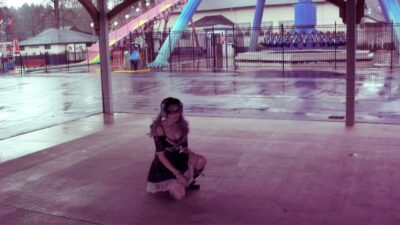

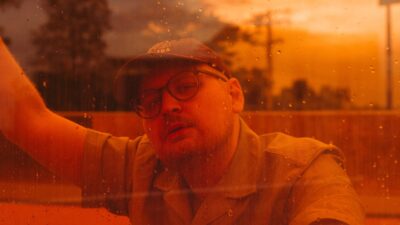
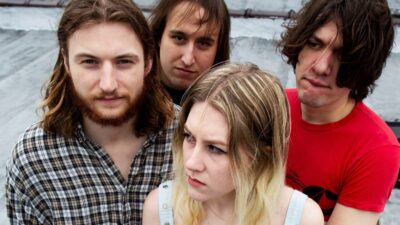

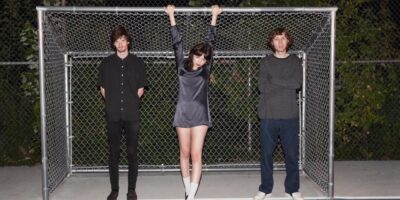

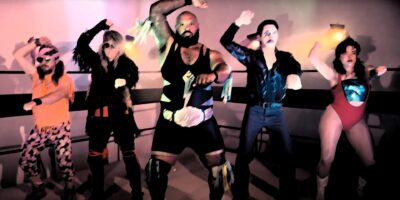
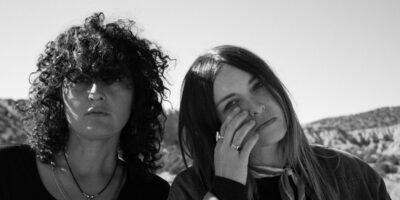
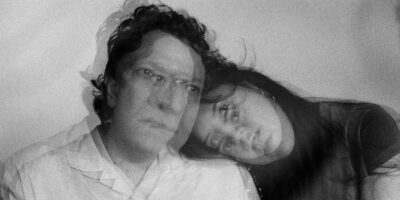




Comments